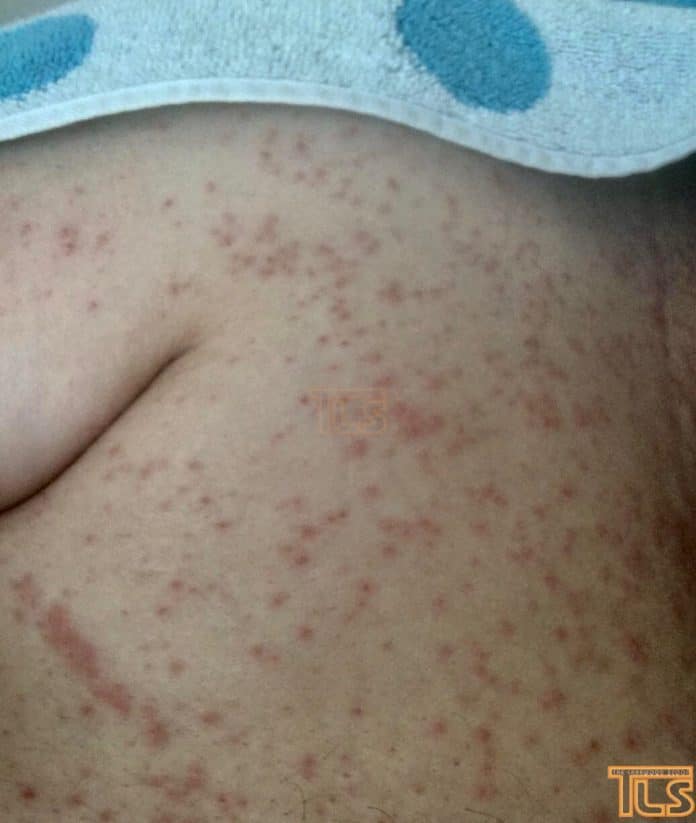
LAKEWOOD – A fourth confirmed case of the measles has hit Lakewood.
The Ocean County Health Department deferred any questions to the New Jersey Department of Health, which has taken the lead on releasing information to the public.
A member of the Department of Health’s Communications Office said the Department would not be releasing the ages of those infected, as the number of cases is so small at this point. When asked how many cases would justify the Department releasing the ages of those infected, the DOH representative reiterated that they are not releasing that information to the public at this time, but will regularly update their website.
The NJDOH is warning anyone who visited CHEMED Health Center, 1771 Madison Ave., between 8:45 a.m. and 1 p.m. Oct. 31 has been exposed to the highly contagious disease.
The Department is working closely with the Ocean County Health Department to identify and notify anyone who may have come into contact with the infected individual.
Anyone who has been to these locations at these listed times has been exposed to measles:
Schul Satmar, 405 Forest Ave., Oct. 13-21 from 1-4 p.m. daily
Eat a Pita, 116 Clifton Ave., Oct. 15 from 7-10 p.m.
CHEMED Health Center, 1771 Madison Ave., Oct. 17 from 3-6 p.m.; Oct. 18 from 10:45 a.m. to 1:30 p.m.; and Oct. 31 from 8:45 a.m. to 1 p.m.
NPGS, 231 Main St., Oct. 25 from 9 a.m. to noon; Oct. 29 from 2:15-4:45 p.m.
Pizza Plus, 241 4th St., Oct. 28 from 12:30-3:30 p.m.
The Department urged anyone who was at these locations during those times contact their health provider immediately. Those exposed can develop symptoms as late as Nov. 21.

Measles symptoms include rash, high fever, cough, runny nose, and red, watery eyes. As an airborne disease, measles spread through coughs or sneezes. People can also acquire the measles if they come in contact with mucus or saliva from an infected person.
Measles can cause serious illness such as pneumonia and encephalitis.
Information about what to do if exposed to the measles can be found here.
Pediatric Affiliates P.A. sent a letter to area school administrators and nurses, a copy of which was shared on The Lakewood Scoop.
If even a single student who tests positive for measles has been in the school, any unimmunized child must stay out of school for 21 days according to Department of Health regulations, the Nov. 1 letter said.
“If there is even one case of measles in the school, any unimmunized student who was in the building must be excluded from school for 21 days. The illness is airborne and gets carried through vents,” the letter said. “If therefore does not matter if the sick child is in a different room or even on a different floor. Anyone in the building when the student was there and for two hours after is considered exposed.”
Students who already had one dose of the MMR vaccinate can receive the second shot and return immediately to school. However, students who were not immunized and have only now gotten the shot must still wait 21 days “until the shot is considered effective,” and must stay out of school.
“If a parent will not comply in keeping their unimmunized child home after there was a case in your school, THE DEPARTMENT OF HEALTH WILL SHUT THE SCHOOL DOWN FOR 21 DAYS,” the letter said.
“Two doses of measles vaccine are about 97 percent effective in preventing measles,” Dr. Christina Tan, state epidemiologist, said. “We urge everyone to check to make sure they and their family members are up-to-date on measles/mumps/rubella (MMR) vaccine and all other age-appropriate immunizations. Getting vaccinated not only protects you, it protects others around you who are too young to get the vaccine or can’t receive it for medical reasons.”
Medical experts recommend two doses of MMR vaccine routinely for children, starting with the first dose at age 12 through 15 months and the second dose at age 4 through 6 years before enrolling in school. Children can receive the second dose earlier, at least 28 days after the first dose.
“If you’re planning an international trip, the World Health Organization recommends that adults or adolescents unsure of their immune status get a dose of measles vaccine before traveling,” Dr. Tan said.
A 27-year-old man from Lakewood returned from a trip from Israel and was the first confirmed case of measles.
Before international travel:
- Infants 6-11 months should receive one dose of MMR. Those who get that one dose should have two more doses at 12-15 months, separated by 28 days.
- Children ages one year and older should receive two doses of MMR, separated by at least 28 days.
- Teenagers and adults who do not have evidence of immunity against measles should get two doses of MMR vaccine separated by at least 28 days.






